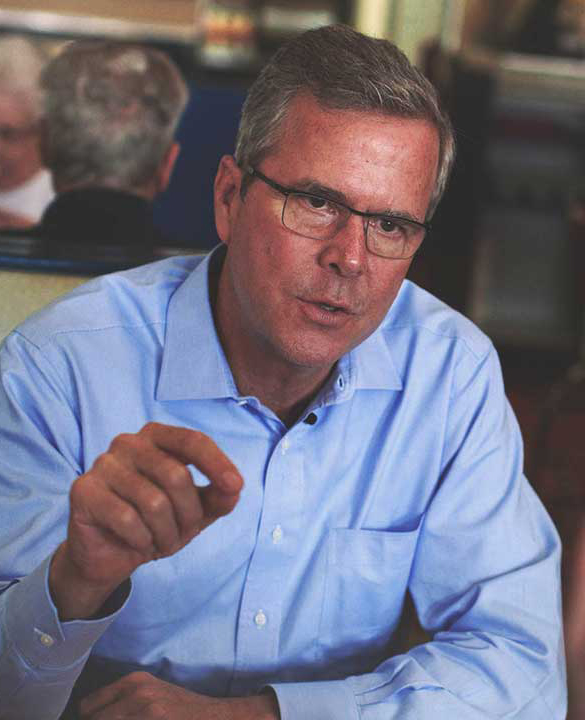
Welcome to ElectionMap. The race for the 2016 presidential nomination has produced numerous candidates for both the Democratic and Republican parties, as well as hundreds of Independent and third-party candidates. ParentMap would like to help our readers make informed decisions going into the election season by providing profiles of many of the presidential hopefuls. We have focused our coverage on three issues affecting families: student loan debt and rising tuition costs; benefits for low-income and working families such as paid parental leave, child care costs and SNAP/WIC benefits; and education issues related to standardized testing, implementation of the Common Core, and Universal Preschool initiatives. For each candidate, we look at their stated positions, as well as (when available) their actual voting history.
Jeb Bush: Republican
Jeb Bush comes from a long line of politicians and policy makers, as the grandson of Sen. Prescott Bush, son of President George H.W. Bush, and brother of President George W. Bush. In 1994, after an early career in real estate development and a stint as Florida’s secretary of commerce, Bush ran for governor of Florida and lost. Undeterred, he ran again in 1998 and won, serving for eight years, until 2006. Since leaving office, Bush has served as an advisor in the health care and banking industries, while remaining active in the political scene in the run-up to 2016.
Jeb Bush’s 2016 Presidential Campaign is centered on the ideas of “Reform and Growth.” The campaign focuses on issues to do with tax code changes; education reform in the form of accountability for test results, charter school initiatives and educational vouchers; veteran’s benefits and health care reform, along with a strengthening of the military; immigration reform through use of technology to secure the border and path to citizenship for those who are already here; and foreign policy work on continued support for Israel and a continued push against the threat of radical Islamic terrorism.
Student loans and rising college tuition costs
Bush, though an active campaigner on issues in education, has not put forth an official stance on the rising cost of college tuition and student-loan debt. He has long favored an increase in for-profit colleges and online education as a way to keep costs low.

What he says
Bush stated, in response to Martin O’Malley’s plan for debt-free college, that the plan “just wipe[s] the $1.2 trillion of debt without reform of our higher education system, more free stuff.” In the same interview, with New Hampshire’s NH 1 news site, he said, “I think the focus ought to be on how we reform higher education so that full-time students can get a four-year degree in four years and they’ll be able to access a job because we’ll have a higher growth economy than the one that he’s probably proposing.”
He has stated, during his time as Governor, “We expanded our community college system and made it more affordable for low-income families. Florida in those years helped thousands more first-generation college students make it all the way to graduation.”
Bush has recently come out in favor of giving Community College students two years of free tuition, through state programs like Tennessee’s. However, when President Obama proposed the same thing a few months before, praising the same Tennessee program, Bush said: “The idea of giving something free — it’s political. It’s poll driven. Someone did a focus group. Free stuff. Free community colleges, it’s a great sound bite.”
What his record says
From 2011–2014, Bush served as a paid advisor and investor at Academic Partnerships, an online education firm that Bush said would bring “down the cost of higher education while maintaining quality.”
While Governor of Florida, Bush signed several budgets that substantially raised college tuition, charted at a nearly 60 percent increase during his time in office. That said, overall college tuition in Florida remained lower than the national average during Bush’s tenure as Governor, even with these increases.
Bush also passed legislation, called “One Florida,” that ended college affirmative action in Florida. The plan increased financial aid to all students, and guaranteed admission to the top 20 percent of Florida’s graduating seniors.
Parental benefits (paid leave, child care, SNAP/WIC benefits)
Jeb Bush has not established a policy on parental leave, child care, or SNAP/WIC benefits. Given his statements on similar benefits, and his record as Governor, it is safe to assume that he is not in favor of increased benefits.
What he says
In a recent conversation with the editor of the National Review, Bush said: “How do you create a system of support that doesn’t create dependency? That’s got to be where the federal government plays a role,” but did not elaborate on what that would entail.
Bush famously called for Americans to increase productivity at a campaign stop in New Hampshire in order to improve their economic circumstances, saying “we have to be a lot more productive, workforce participation has to rise from its all-time modern lows. It means that people need to work longer hours and, through their productivity, gain more income for their families.” Bush later clarified that he meant part-time workers should be able to work full-time.
In 1994, when running his first campaign for Governor of Florida, Bush said: “If people are mentally and physically able to work, they should be able to do so within a two-year period. They should be able to get their life together, find a husband, find a job, find other alternatives in terms of private charity or a combination of all three.”
What his record says
In 1994, when campaigning for governor, Bush proposed that Florida should no longer accept federal aid for impoverished families, and assistance should be restricted to only two years. In order to receive benefits, women should be required to “identify the fathers of their children, submit to random drug tests and work if jobs were available,” according to the Miami Herald.
As governor, Bush “took the state’s government almost entirely out of the business of providing a social services safety net to its most vulnerable citizens, and turned the provision of these services over to the private and non-profit sectors,” according to the book Jeb Bush: Aggressive Conservatism in Florida.
Education (Common Core, standardized testing, universal preschool)
Jeb Bush is passionate about education reform. He is a proponent of standardized testing as a means for assessing school performance. Bush is in favor of universal preschool, making it available to all 4-year-olds in Florida in 2005.
What he says
Bush has long supported the Common Core, though he has carefully dialed back his overt enthusiasm for the politically unpopular program, clarifying: "I'm for higher standards — state-created, locally implemented — where the federal government has no role in the creation of standards, content or curriculum.”
Bush describes his education reform during his time as Governor: “Florida’s high school graduation rate rose by 50%. The number of schools rated A or B increased from 21 percent to 74 percent. Florida led the nation in improvements for low-income and black 4th grade literacy.” He credits this to a program of standardized testing, charter schools and vouchers to allow school choice.
"Ensuring students enter kindergarten well prepared ultimately results in greater opportunity for all students to succeed," Bush stated in 2005, when he signed into law the bill creating voluntary Pre-K education for all four year-olds in Florida.
What his record says
In 2014, Bush’s educational foundation created an advertisement advocating for the Common Core’s adoption. In the first Republican debate, Bush continued this advocacy, stating: “I think the states ought to create these standards. And if states want to opt out of Common Core, fine. Just make sure your standards are high ... ”
Along with his implementation of tougher standards, especially in reading, in Florida, Bush secured funding for low-performing schools and also created the Florida Center for Reading Research, which is broadly credited with raising the reading scores of Florida’s fourth graders. He does acknowledge that schools may be testing students too much: “You could have fewer tests and achieve the desired results of transparency and accountability for sure.”
Bush’s implementation of voluntary universal pre-school has not necessarily resulted in a high-quality program. Spending on the program is very low, and the National Institute for Early Education Research’s 2014 “State of Preschool Report” ranked Florida’s program 37–38th out of the participating states for quality.











